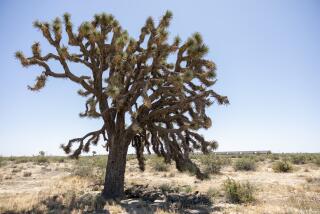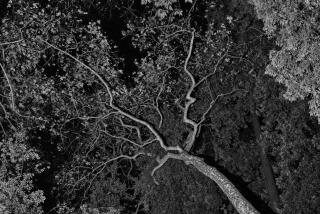‘God’s Curse on Us’ : Parasites Threatening the Cedars of Lebanon
- Share via
BESHARRE, Lebanon — The cedars of Lebanon, which have survived from biblical times to become the national symbol of this troubled land, are now endangered by parasites.
Branches are beginning to wither on some of the 400 trees that form the largest remaining grove of cedars in Lebanon.
“It is a bad omen,” said an old man living in the shadow of the cedars near this northern mountain town. “It might mean the end of the world is nearing.”
The grove, believed by local inhabitants to be at least 2,000 years old, is virtually a shrine to the Lebanese, who call the stately trees the “Cedars of God.”
However, this year, environmentalists discovered that tiny Thaumetopea libanotica worms were laying eggs in the roots and branches of the magnificent evergreens, causing yellowing and death.
Symbolic Value
An estimated 3,000 smaller and younger cedars survive in good health in other parts of Lebanon, but they do not have the symbolic value of this ancient grove, which stands at the foot of a magnificent ring of mountain peaks in one of the most beautiful spots in Lebanon.
“If they go, the last symbol of Lebanon will die,” said a woman who runs a small cafe beneath the oldest tree.
“The Cedars of God look like an old man’s hair turning white,” the old man added. “This is God’s curse on us Lebanese.”
Lebanese University environmental researchers George and Henriette Tomeh raised the alarm in August after white spots were found on the trunks of some of the cedars.
“We raise our voice to the world to help the cedars and avert a catastrophe,” said George Tomeh, who heads the Lebanese University in Beirut.
They also say some trees in the grove are thousands of years old.
“The cedars look tired,” his wife observed.
She said the grove’s popularity among Lebanese who come to picnic, barbecue and dance under the trees is causing the problem.
“People stepping on the grass under them over the years eliminated an insect that in the natural process gets rid of the deadly worms,” she said. “The natural process was disrupted, and the roots are now exposed with no soil to protect them.”
Troops now guard the trees from the public.
“Agriculture Ministry experts are studying the disease,” Kayrouz said as he escorted a reporter into the grove, where dead branches had been lopped from trees in a bid to stop the scourge from spreading.
Legend, History
The cedars spread in forests over the mountains of Lebanon long before the birth of Jesus. Local legend says the cross on which Jesus was crucified was made partly from the cedars.
The Bible says the Hebrews used the timber to build the Temple of Solomon. Assyrians, Persians, Phoenicians and Romans stripped the forests for their sailing fleets. Now, the mountains of Lebanon are mostly bare.
A visit to the grove has long been a treat for foreign dignitaries, who sign a guest book at an old stone chapel in the heart of the grove.
“I remember Charles de Gaulle, the French general, when he was here in the 1940s,” said the old man proudly. “Kurt Waldheim (former United Nations secretary general) said he felt he was near God when he saw the cedars.”
Lebanon’s 10-year-old civil war is not making saving the cedars any easier. Foreign environmentalists have offered to help, said Henriette Tomeh, “but how can you tell them to come to a place where the war means you never know when you can leave your house?”
More to Read
Sign up for Essential California
The most important California stories and recommendations in your inbox every morning.
You may occasionally receive promotional content from the Los Angeles Times.













